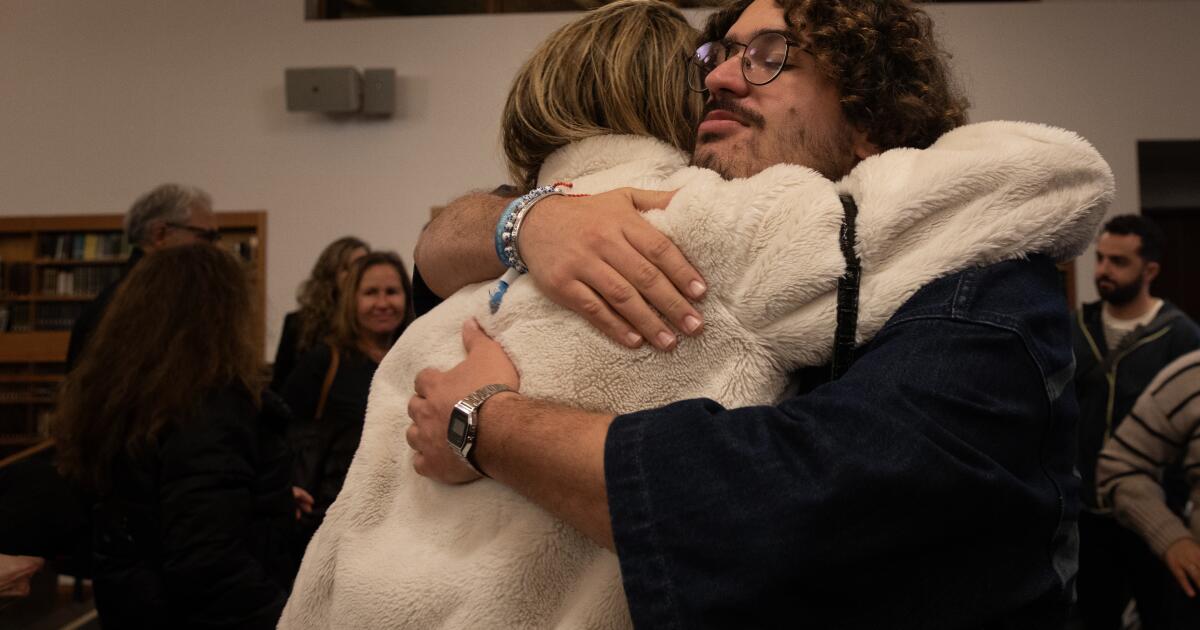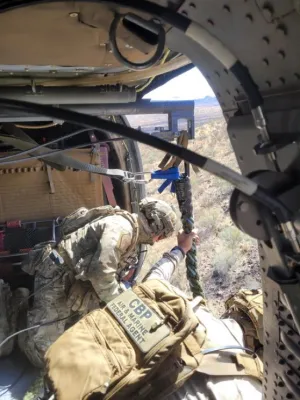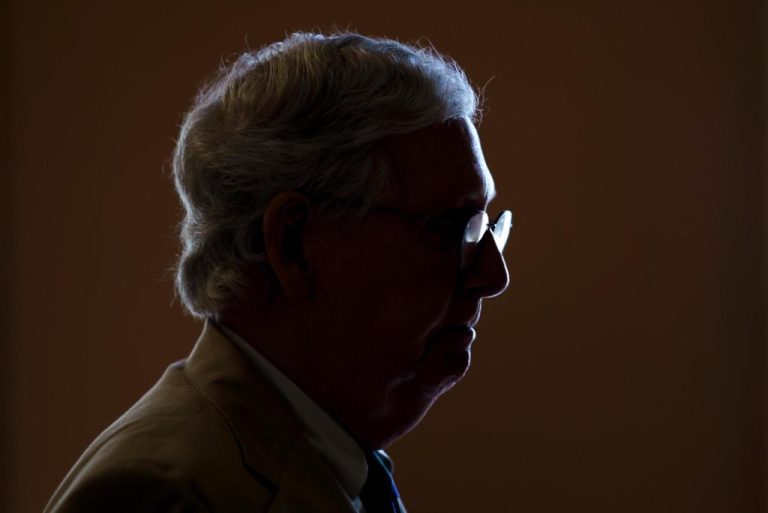
Rotem Cooper lives in San Diego, but his thoughts are daily with his 85-year-old father Amiram Cooper — one of scores of people who remain a hostage of Hamas.
“He can’t give up,” the younger Cooper said. “I can’t give up.”
Last weekend marked 100 days since assailants stormed into a collection of kibbutzs in Israel along the Gaza border, killing several residents and kidnapping others. Rotem Cooper’s mother and father were in bed when men entered the kibbutz his father helped found. The couple were taken from their home and held hostage.

Rotem Cooper, son of Amiram Cooper, participates in a panel discussion in La Jolla Monday. Both his parents were taken from Kibbutz Nir Oz by members of Hamas on Oct. 7, but his mother, Nurit, was later released.
(Ana Ramirez/The San Diego Union-Tribune)
After 16 days in captivity, his 79-year-old mother, Nurit Cooper, was released, one of two women whose videotaped handover by Hamas made worldwide news. Amiram Cooper remains captive.
Rotem Cooper, 57, joined the families of three other hostages Monday evening for a panel in front of about 500 people in La Jolla to share their stories of worry and dread and continuing hope.
The Hostage and Missing Families Forum organized the traveling delegation of families of hostages, some of whom have traveled the world to speak. Because Cooper lives close, he joined the panel for the local presentation.

Dahlia Cooper holds a poster of father in-law Amiram Cooper during a panel discussion in La Jolla Monday
(Ana Ramirez/The San Diego Union-Tribune)
About 1,200 people in Israel were killed in the surprise Oct. 7 attack by Hamas — designated as a terrorist organization by the U.S., Canada and European Union — and more than 240 were taken hostage. Several were released in the weeks that followed. The Hostage and Missing Families Forum say 136 people remain captive. Returnees say they were kept in windowless rooms and given little food.
The Hamas ambush prompted a prolonged military offensive from Israel into Gaza that the Associated Press reports has killed more than 24,000 people, citing Palestinian authorities. The news agency also reported that by one estimate, two-thirds of the buildings in northern Gaza have been damaged or destroyed. United Nations agencies warn of the need for aid to reach people in Gaza to prevent disease and famine. Many around the world have called for a cease-fire.
On Monday night after the panel members spoke, another man in the audience stood up and shared, for the first time publicly, his connection to one of the hostages. San Diego resident David Markowicz said he is the uncle of 35-year-old Sagui Dekel-Chen, who lived in a kibbutz along the border. After hiding his pregnant wife and young children, Dekel-Chen fought off the intruders before he disappeared. The family later learned he had been taken.

David Markowicz speaks during a panel discussion Monday in La Jolla, where families members of hostages held in Gaza since Oct. 7 spoke about their ordeal. Markowicz’s nephew, Sagui Dekel-Chen, was among those taken. Nearby, David’s wife, Janet Markowicz, holds a poster of Dekel-Chen.
(Ana Ramirez/The San Diego Union-Tribune)
Markowicz told the Union-Tribune why he decided it was time for him to speak out. “In my mind and heart, it’s true that the world has forgotten about the hostages, and I wanted to remind the San Diego community I live in that the situation still exists,” he said.
It was a sentiment shared by all the panel members. The idea behind the discussions is to keep the story front of mind, to keep up pressure to release those who remain captive since the attack on several sites, including a music festival attended by hundreds.
That’s where Shem Tov, 21, was taken. As the attackers swarmed, Shem Tov told his family over the phone he was trying to get away. His sister said in an interview Monday night that, at her suggestion, he shared his phone location. She watched as his phone moved closer to the Gaza strip. He no longer answered. Later that night, his family saw video of him tied up in the back of a pickup truck.
For the first 57 days after the Hamas attack, the family of Ron Benjamin did not know his fate. He had driven an hour to the border area to take long bike ride. Around 6:30 a.m., he called his daughter and said there were rockets overhead. His car was later found, bullet-riddled. No word from him.
In December, Israeli authorities told Benjamin’s family they’d confirmed he was among the hostages. His daughter Shay Benjamin told the La Jolla audience it was a relief to hear the news. “We know he is there and we have something to fight for,” she said. But beyond that, “we know nothing.”
San Diego attendees also heard from the cousin of Noa Argamani, 26, who also was taken from the music festival. She was featured in two videos Hamas released earlier this week, but it’s not clear when the footage was shot.






